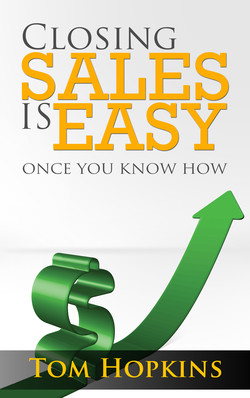Читать книгу Closing Sales is Easy - Tom Hopkins - Страница 4
На сайте Литреса книга снята с продажи.
ОглавлениеClosing Is Easy, Once You Know How
In the selling profession, a closed sale creates a winning score. It’s the bottom line, the name of the game, the point of it all.
You might already know plenty of techniques for prospecting, meeting new people, qualifying, pre-senting, overcoming objections, and so on. But, if you can't close, you're like a football team that can't sustain a drive long enough to score. It does you no good to play the whole game in your own territory and never get across the goal line.
If you don't love the closing process now, start falling in love with it because this is where the money is.
Effective sales trainers and managers will tell you to follow your A.B.C.s: Always Be Closing!
True professionals are closing all of the time. They close for names. They close for appointments, visits or meetings. They close on earning trust...on getting down to business. They close on their own credibility and competence. They are constantly trying test closes, and they can move smoothly into their final closing sequence any time they notice a buying sign.
In this special report, we’ll cover some of the most effective strategies I’ve ever used (and taught) to close sales. If you have never tried them, please do. They can make a world of difference in the results you’re getting.
None of these ideas are all that unusual. They’re not radically different from how most people behave on a day-to-day basis. It’s the when and how of using them that makes them (and you) winners.
Perhaps you’ve heard the old saying, “It’s not what you say that matters. It’s how you say it.” How you speak to potential clients can and will truly make a difference in your level of success in sales.
And the concept of when to say it is just as important. Many untrained salespeople get so wrapped up in their selling processes that if the potential client decides to invest before they're through presenting, they won't let it happen. For some reason that’s beyond my understanding, they feel com-pelled to finish their presentations and will often talk the client out of the sale.
How silly is that?
To think you have to complete your sales process from A to Z without leaving out J, P, or X is counter-productive.
The key to success in selling is to be flexible. Of course, never plan to take shortcuts, but be prepared to hop a few fences if your potential clients are moving along faster than you expected.
Some people get sold quickly. If you keep talking instead of getting the final agreement, you might just un-sell them. More talk has the potential to trigger more objections. When the buyers are ready with their decision to go ahead, stop talking and start filling out your paperwork!
